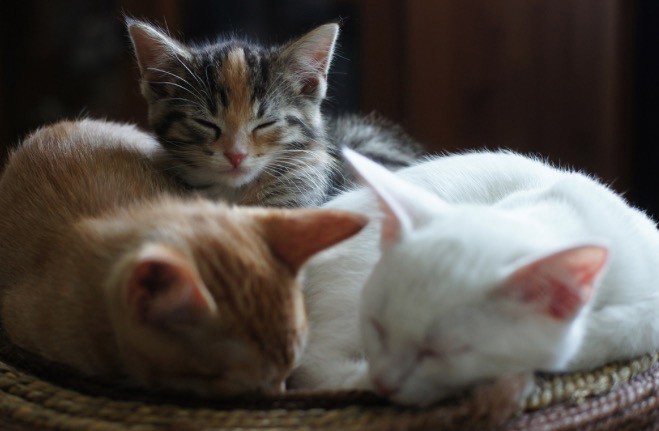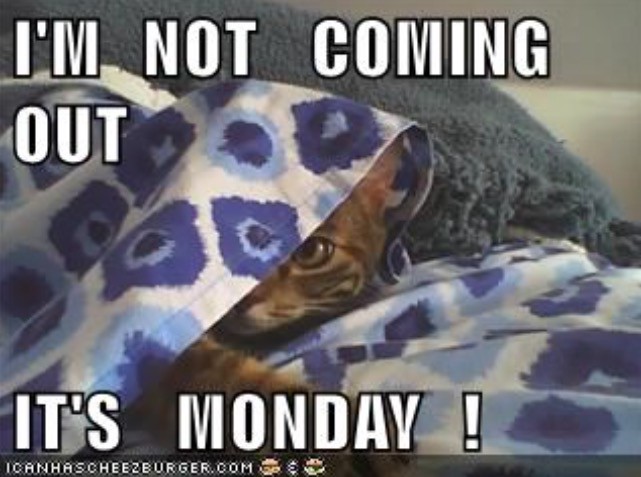No Sleeping Cats
by Kevin Nguyen

My first job out of college was at I Can Has Cheezburger, where I was paid ten dollars an hour to format posts in WordPress. That might not seem like a lot, but this was 2009, and adjusted for inflation today, that would be $10.94.
On my first day, I learned two things. One was the company motto: to make people laugh for five minutes a day. The second was Cheezburger’s only rule: No Sleeping Cats.
My boss, Emily, explained that readers might confuse sleeping cats with dead cats, and the last thing we wanted to do was upset our audience with a potentially dead cat.
“Never any sleeping cats?” I asked.
“Never,” Emily said.
“Not even if they’re really cute?”
“Never ever.”
I remember this conversation because it’s funny and kind of peculiar. I also remember it because I saw the exact same conversation re-enacted on screen, three years after I’d left the company, in the opening scene of a comedic faux documentary TV series about Cheezburger that aired on Bravo, called LOLWork. Emily is in the scene, as is the CEO Ben Huh, pacing at a treadmill desk. Aside from them, everyone I’d known and worked with at I Can Has Cheezburger had been replaced by people who were suspiciously good looking. “Just as a general blanket rule, no sleeping cats ever?” asks Paul, the eccentric, bushy-haired content editor who is supposed to be me.
Emily replies, “People don’t come here to see dead cats.”
The No Sleeping Cats Rule has probably been told to just about every Cheezburger employee on his or her first day, but it’s hard to separate myself from that moment. Reliving a conversation I’d had years before was like an out-of-body experience, only with poorer production values. The archetypes of my former colleagues were there, but this bunch was more attractive. Except Paul. I should point out that the only ugly person in the show is supposed to be me.
The show could be described as “bad” and “not at all good.” Almost all of the talking-head interviews are exposition or opportunities for one person express his or her contempt for someone else. This obvious imitation of The Office is lazy, but the show does dive into strangely ambitious metafictional plot lines. In the first episode, Ben has the Cheezburger staff team up to produce ideas for a webseries that will be “like a miniature TV show” — a show within a show, right out of the gate. The fifth episode finds the office raising money so someone’s cat can have nine-thousand-dollar hip replacement surgery, so the content team decides to run a telethon, complete with talent show and a bachelor auction. The episode becomes so high concept — another show within a show — that it veers into pretension. LOLWork even has the audacity to feature someone performing Hamlet’s “to be, or not to be” soliloquy translated into LOLspeak. All this teetering back and forth between clever and inane makes it impossible to know just how self-aware the show is, what exactly it is trying to project, and to whom.
If there is a bright spot in the LOLWork, it’s watching the show do its best to establish romantic tension as quickly as it can in its six-episode run. The prospective pair also happen to be the most attractive people. There’s Forest, a content editor who possesses the anxious charm of Adam Scott, and Sarah, the quiet art director who hides behind her bangs. The show does little to disguise that their courtship is manufactured. In one episode, Emily prods Sarah about her feelings toward Forest, as if it is entirely normal and appropriate for your boss to ask you if you want to bang your co-worker. Still, this is where the cynicism of LOLWork’s cast is best employed. When asked about Forest and Sarah, some of the coworkers are nosey, while others remain apathetic. Will, the content supervisor, says, “Watching Forest try to pick up on Sarah is like watching a dog hump a pillow. You just want to look away.” Later, he delivers the series’ best line: “Listening to straight people talk about dating is very exhausting.”
More than two years after the show had ended, I emailed Forest to see if I could ask him a few questions about LOLWork. We never overlapped at Cheezburger, and he had since left the company, so he was happy to talk. Forest explained that while the show was not scripted, it was “highly directed.” No lines were given, but each scenario and situation was planned out by the producers. The same scenes were played out multiple times to catch them at different angles. When I asked him what LOLWork’s semi-fictional depiction of the work place was attempting to evoke, he urged me to not read too far into it.
He talked at length about the artifice of reality television — not necessarily a new idea, but one that was interesting to hear from someone that had been party to the charade.
The biggest surprise was that his relationship with Sarah was actually genuine. Or at least it became genuine: Forest and Sarah started dating toward the end of filming, and their relationship continued for another year before they broke up. Sarah reiterated the same notion: “Our relationship was genuine. A lot of it we actually had to hide from the cameras, rather than play it up.”

Two years since LOLWork aired, no one from the show except Ben and Emily are still at the company. Though it grew quickly in its early years, I Can Has Cheezburger’s growth flattened as its users moved from reading primarily on desktop computers to mobile devices. Ben raised an additional thirty million dollars, raising the stakes of what Cheezburger had to become to remain profitable. I heard stories from old colleagues that when the round of investment was announced, Ben went around the office handing out envelopes filled with a thousand dollars in cash to each employee. (This is not dissimilar from what Shane Smith did before VICE’s 20th anniversary party.)
In April of 2013, a third of the company was laid off. In tech lingo, you might say the business “didn’t scale.” Ben writes somewhat regularly on Medium about what it’s like to manage the company. He’s reflective on his own shortcomings and the decisions that led to the company’s failures. In a post he concedes that venture capital transformed the company into “a confused, money-losing mess.” This past July, Ben stepped down as CEO. In his farewell post (obviously on Medium), he wrote, “The time has come for Emily and I to go on another unscripted adventure, without a reality TV crew.”

There has been a recent trend in treating business failures as a badge of honor, particular among startups. This, unsurprisingly, is how people talk about failure when they risk nothing, when you’re in your early twenties and playing with someone else’s money.
I wonder what LOLWork would have been like if it had been on long enough to see the company diminished. What if the show possessed Ben’s newfound self-awareness? This version of Cheezburger, the one in decline, is the one I wish I could see. But that probably doesn’t make good television. I rarely tell anyone that I worked at I Can Has Cheezburger anymore — not because I’m embarrassed, but because people are usually disappointed when I don’t have funny anecdotes about it.
The only notable story I have is about my weirdest day of work. During a period of rapid growth, Cheezburger shared the floor with a medical supply company that was not doing as well. A couple months into my brief tenure, their entire sales team was abruptly laid off. The company sold machines that prevent sleep apnea; I asked a colleague what sleep apnea was exactly, and she described it as a disorder that causes breathing issues during sleep, the most serious of which could cause strokes.
“So the machines they’re selling prevent people from dying in their sleep?” I asked.
“Yes, literally that,” she said.
When I went to the kitchen to microwave my lunch, I saw a woman sobbing and asking herself out loud how she was going to find another job. I didn’t know what to say. It seemed unjust that a company that actually made people’s lives better could be on the rocks, while a bunch of poorly dressed nerds who posted dumb pictures on an even dumber website would flourish. Instead of saying anything to the woman, I took my lukewarm Thai food and went back to my desk and to upload some photos of Lady Gaga into WordPress.
Later, I saw Emily consoling some of the supply company salespeople, offering them free Cheezburger merchandise like t-shirts and stuffed animals from our unsold inventory. It seemed half-hearted, but it appeared to cheer up at least a few people. People smiled, and it was the first moment I realized why the site had captured such a massive audience. All good comedy is about timing. It turns out making people laugh for five minutes a day could be important, if you caught them during the right five minutes.
A longer version of this essay appears in the anthology Cat Is Art Spelled Wrong, available from Coffee House Press on September 15.
Photo by Alexandra Guerson
